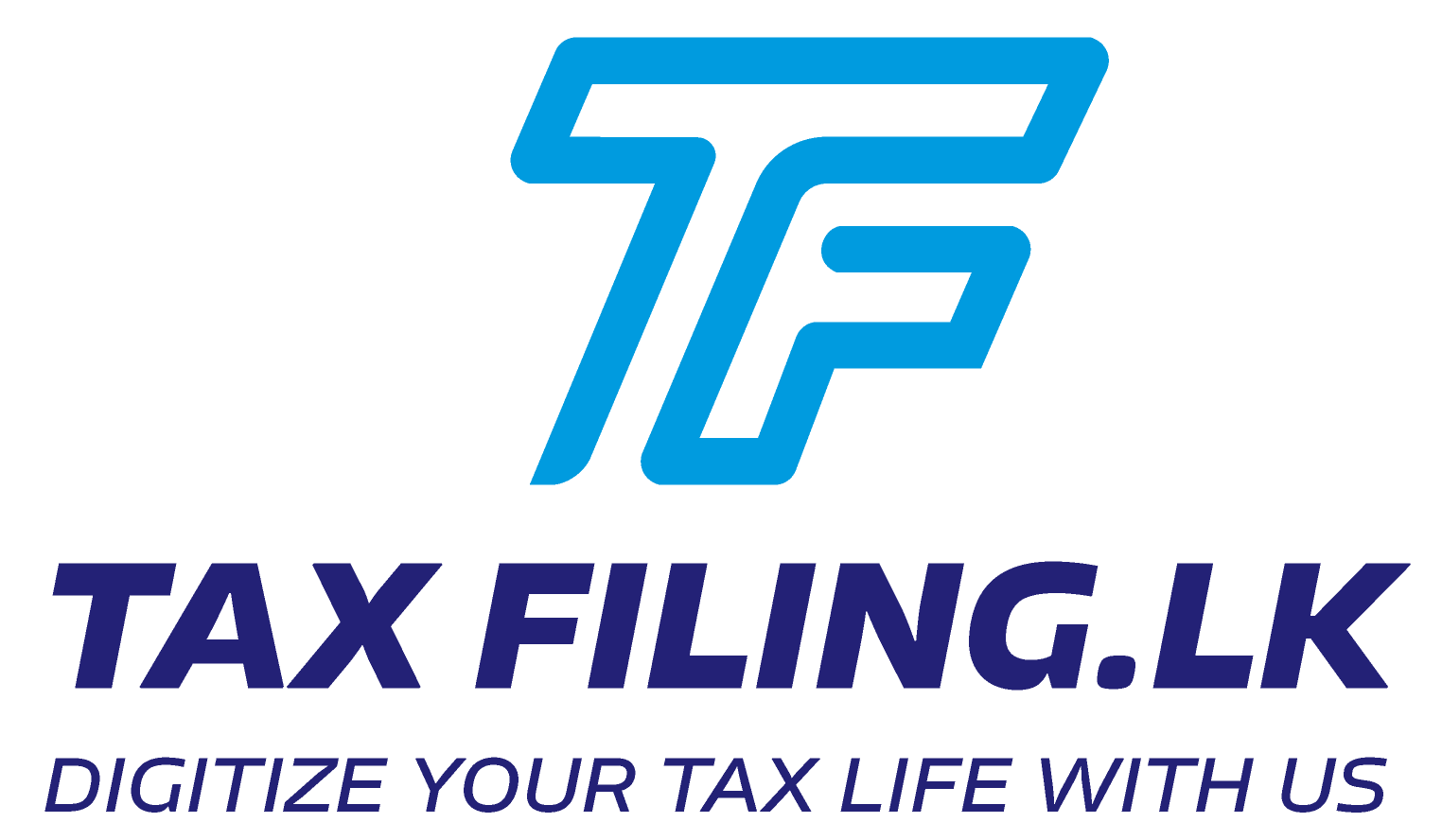Budget 2026
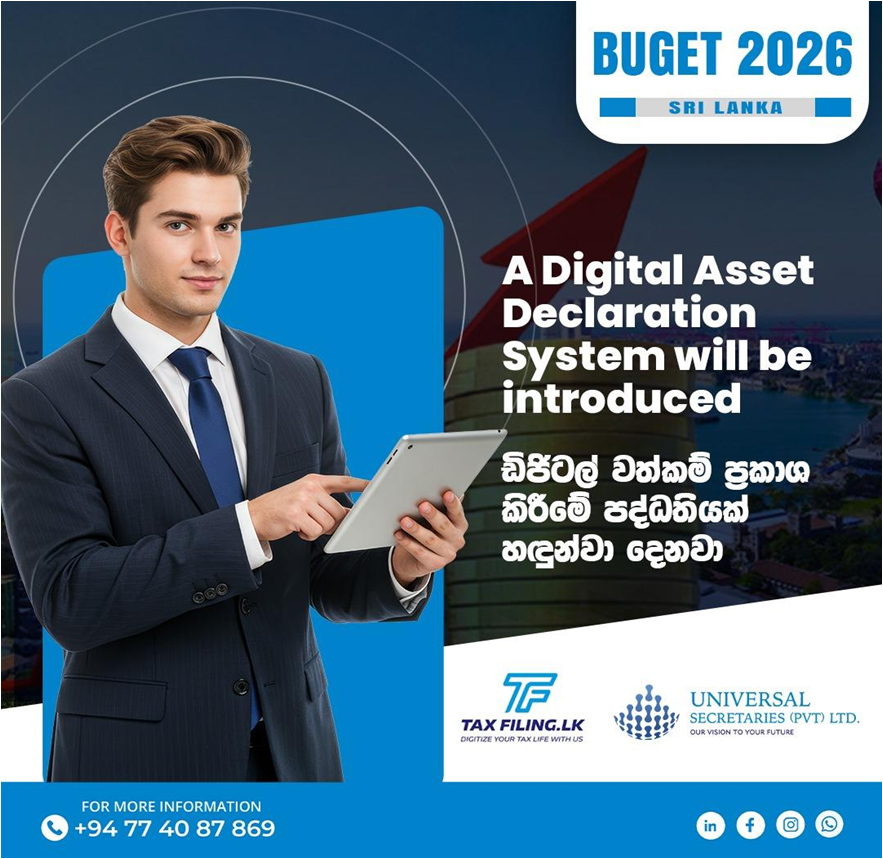
By March 2026, the government will introduce a digital system for citizens to submit their asset declarations online, announced the President.
This initiative marks a key step toward enhancing transparency, accountability, and digital governance in Sri Lanka. 🇱🇰💻
2026 මාර්තු වන විට පුරවැසියන්ට තම වත්කම් ප්රකාශයන් අන්තර්ජාලය හරහා ඉදිරිපත් කිරීමට ඩිජිටල් පද්ධතියක් හඳුන්වා දෙන බවට අයවැය කතාවේදී ජනපති නිවේදනය කරයි. විනිවිදභාවය හා ඩිජිටල් පාලනය වෙනුවෙන් තැබූ වැදගත් පියවරක්! 🇱🇰💻
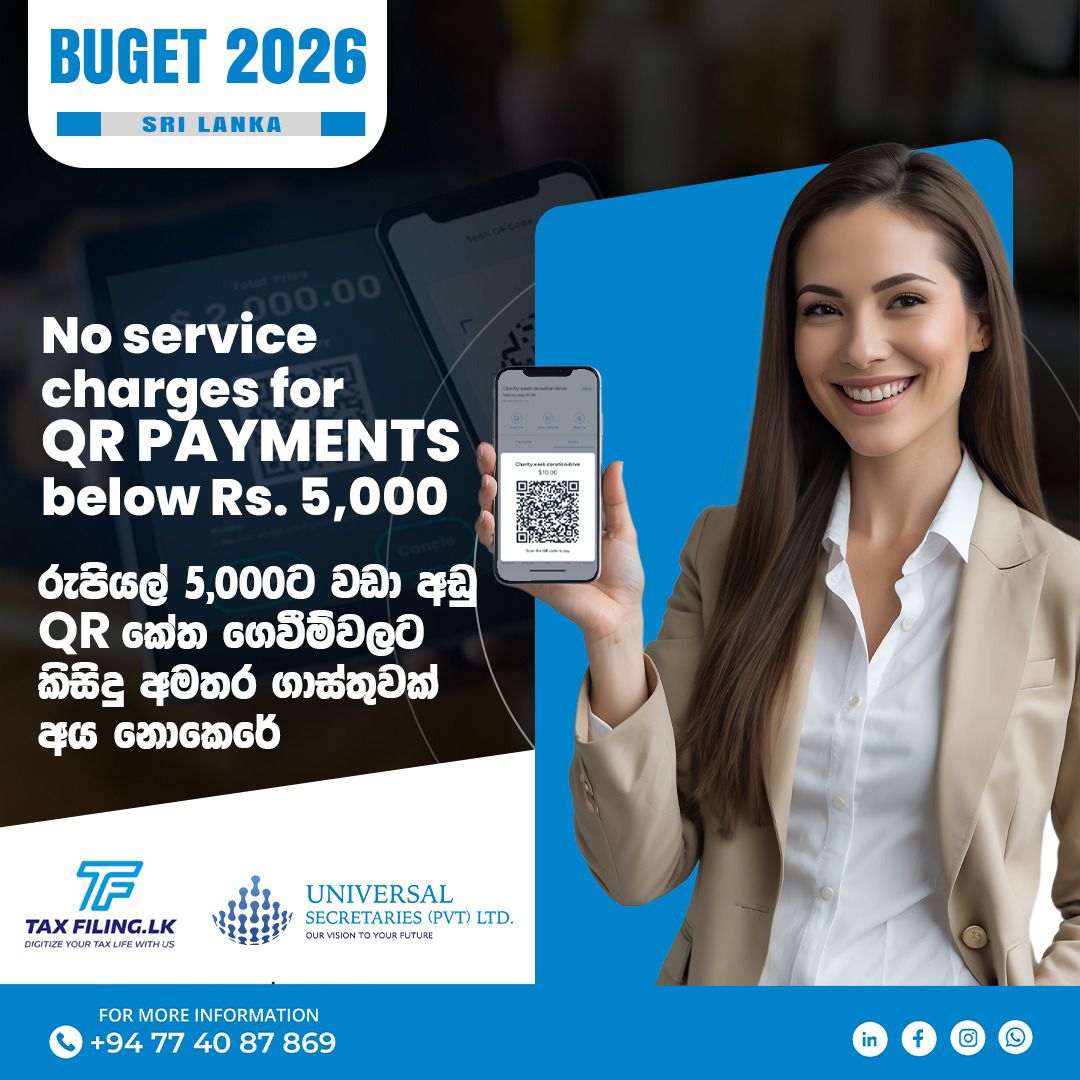
රුපියල් 5,000ට වඩා අඩු QR කේත ගෙවීම්වලට කිසිදු අමතර ගාස්තුවක් අය නොකෙරේ
No service charges for QR payments below Rs. 5,000.00
No service charges for QR payments below Rs. 5,000.00
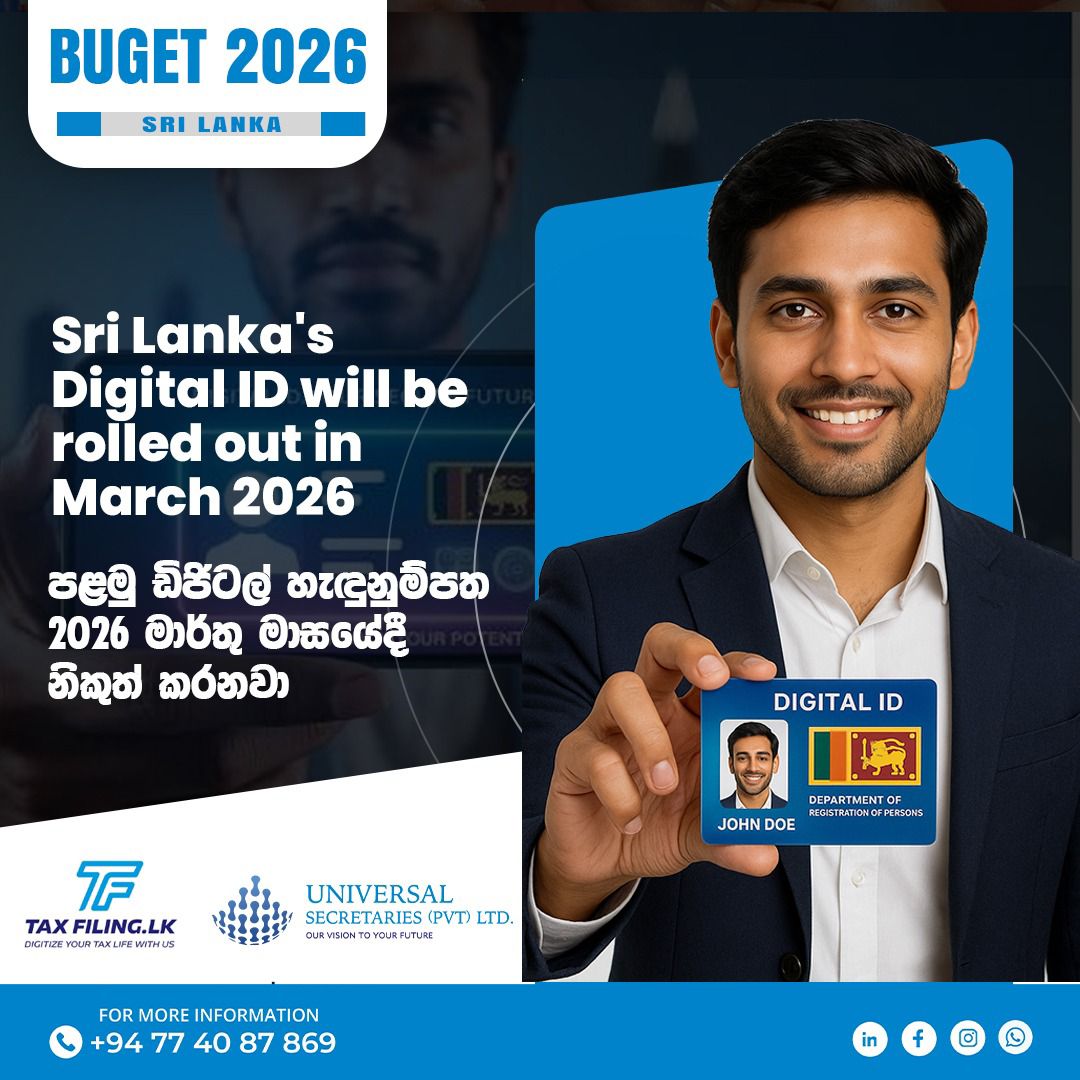
පළමු ඩිජිටල් හැඳුනුම්පත 2026 මාර්තු මාසයේදී නිකුත් කිරීමට සැලසුම්
Sri Lanka's Digital ID will be rolled out in March 2026
Sri Lanka's Digital ID will be rolled out in March 2026
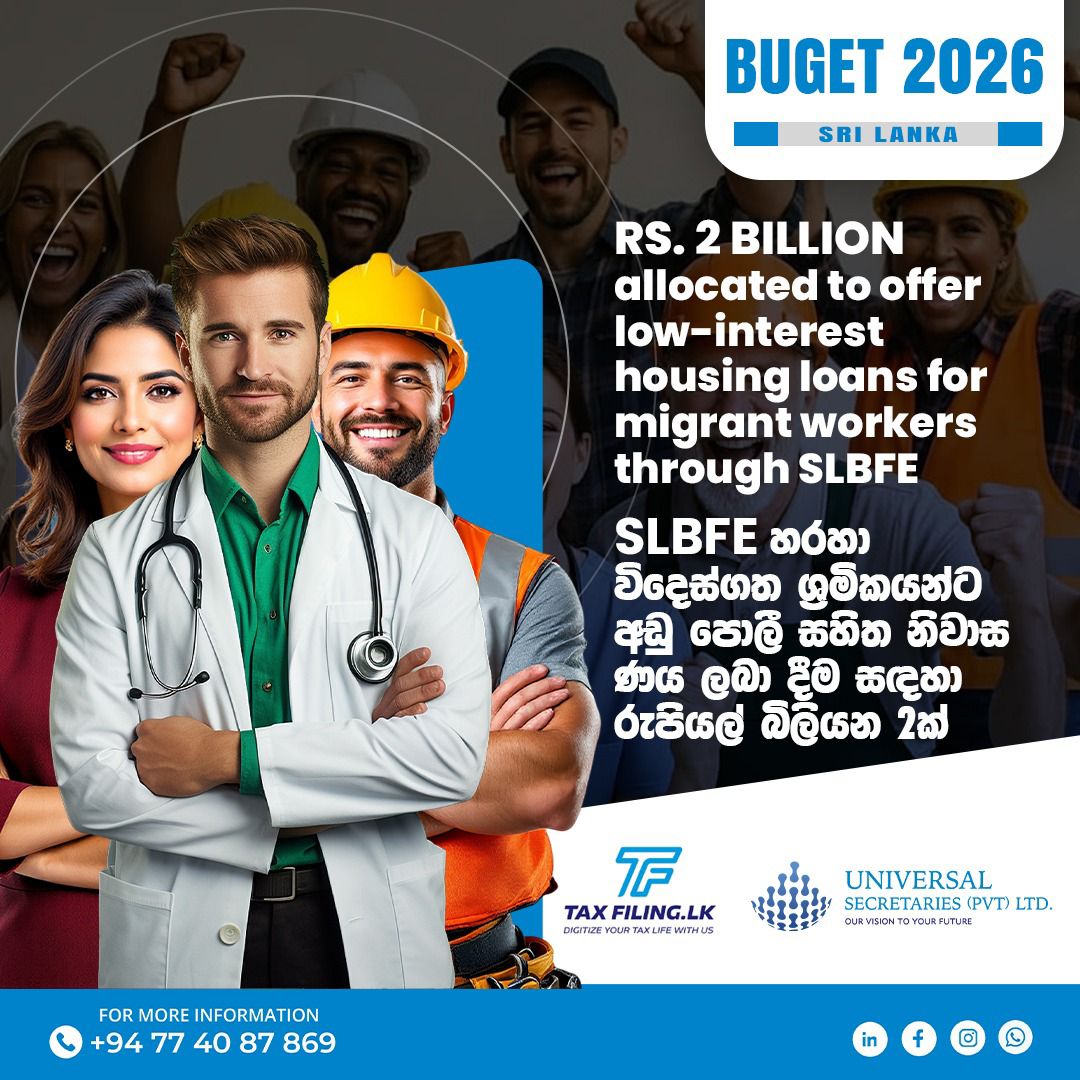
විදේශ සේවා නියුක්ති කාර්යාංශය (SLBFE) හරහා විගමණික ශ්රමිකයන් සඳහා රුපියල් බිලියන 2ක මුදලක් වෙන් කර, අඩු පොලී නිවාස ණය ලබා දීමට කටයුතු යොදා ඇත.
Rs. 2 Billion allocated to offer low-interest housing loans for migrant workers through SLBFE
Rs. 2 Billion allocated to offer low-interest housing loans for migrant workers through SLBFE
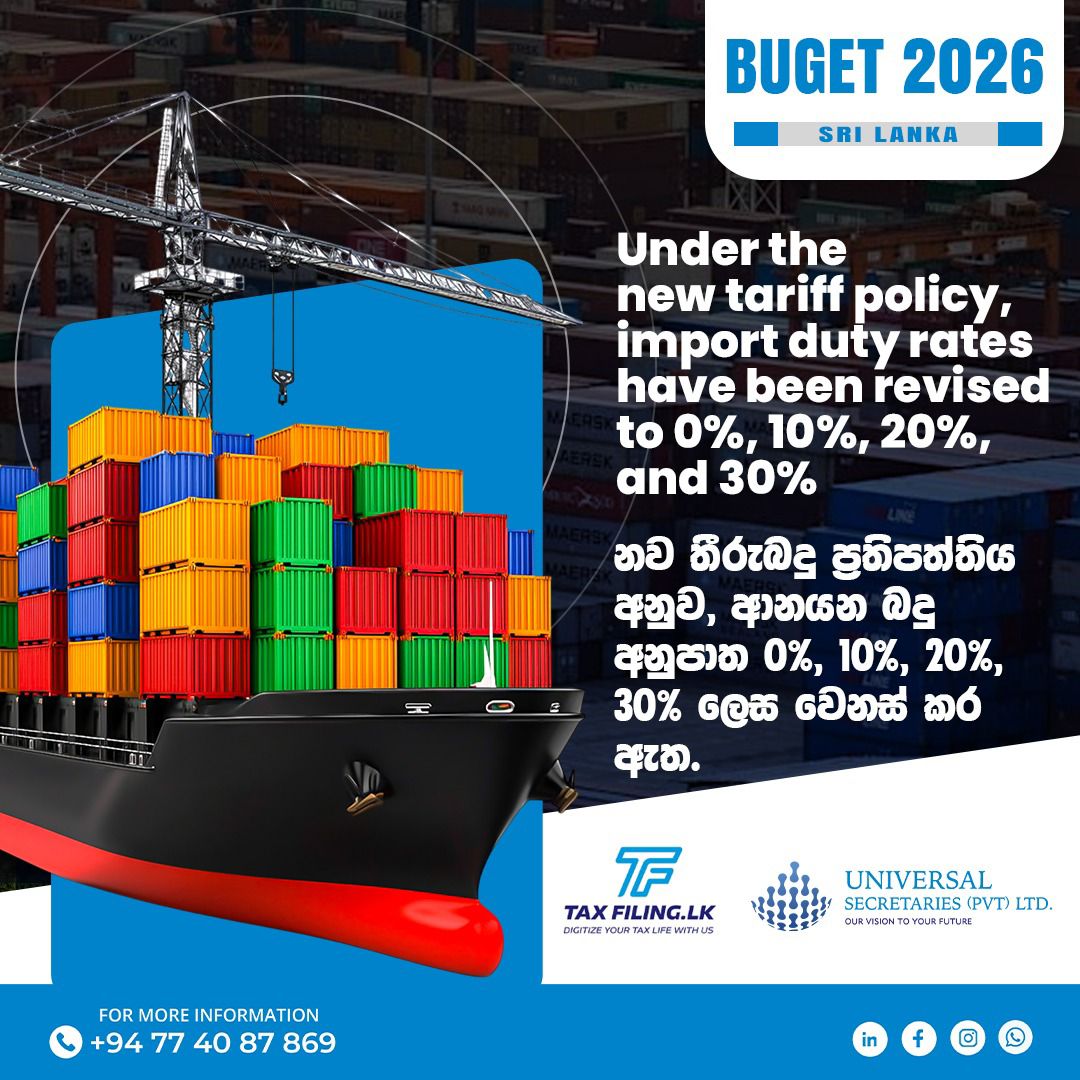
නව තීරුබදු ප්රතිපත්තිය අනුව, ආනයන බදු අනුපාත 0%, 10%, 20%, 30% ලෙස වෙනස් කර ඇත.
Under the new tariff policy, import duty rates have been revised to 0%, 10%, 20%, and 30%
Under the new tariff policy, import duty rates have been revised to 0%, 10%, 20%, and 30%
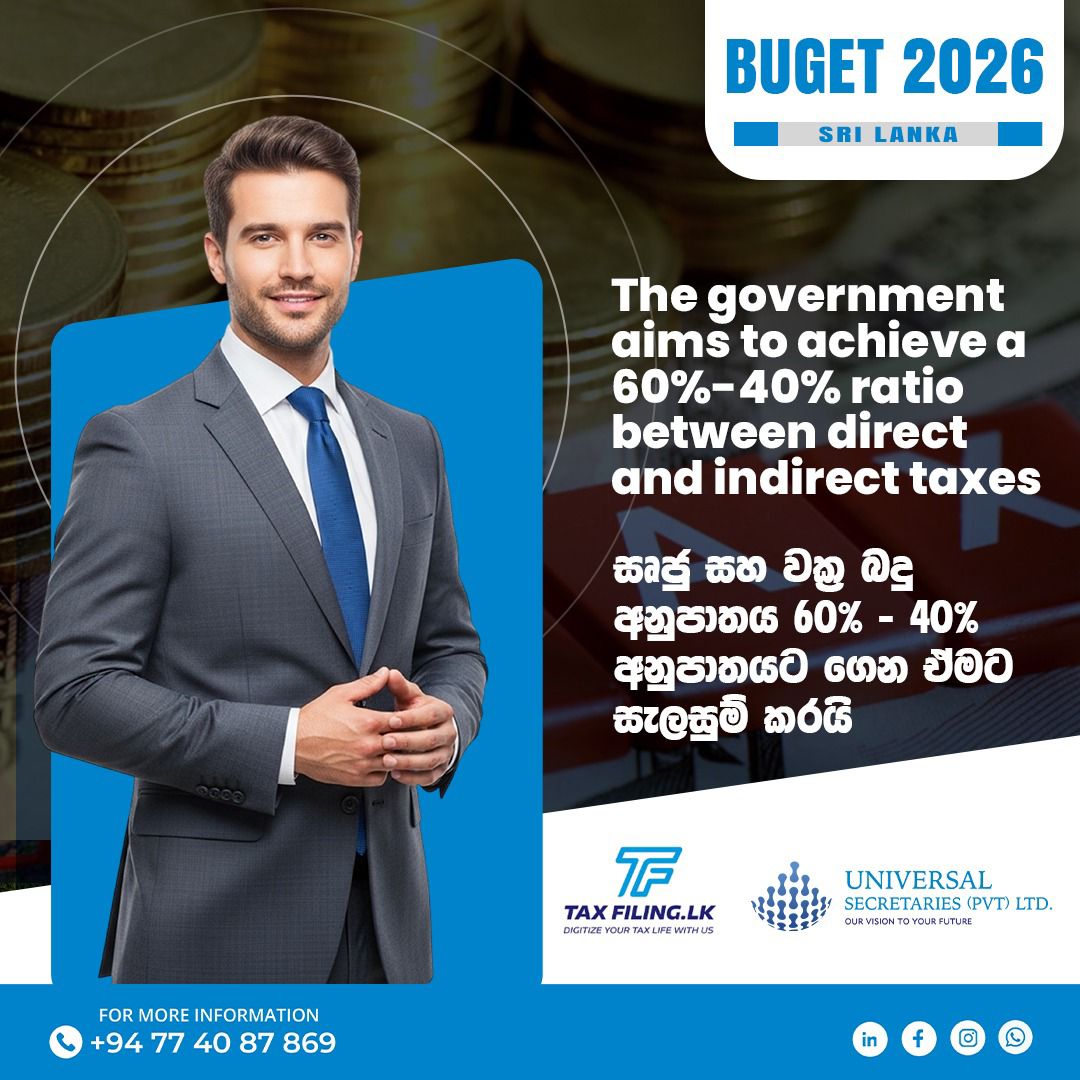
සෘජු සහ වක්ර බදු අනුපාතය 60% - 40% අනුපාතයට ගෙන ඒමට කටයුතු කරනවා
The government aims to achieve a 60%-40% ratio between direct and indirect taxes
The government aims to achieve a 60%-40% ratio between direct and indirect taxes
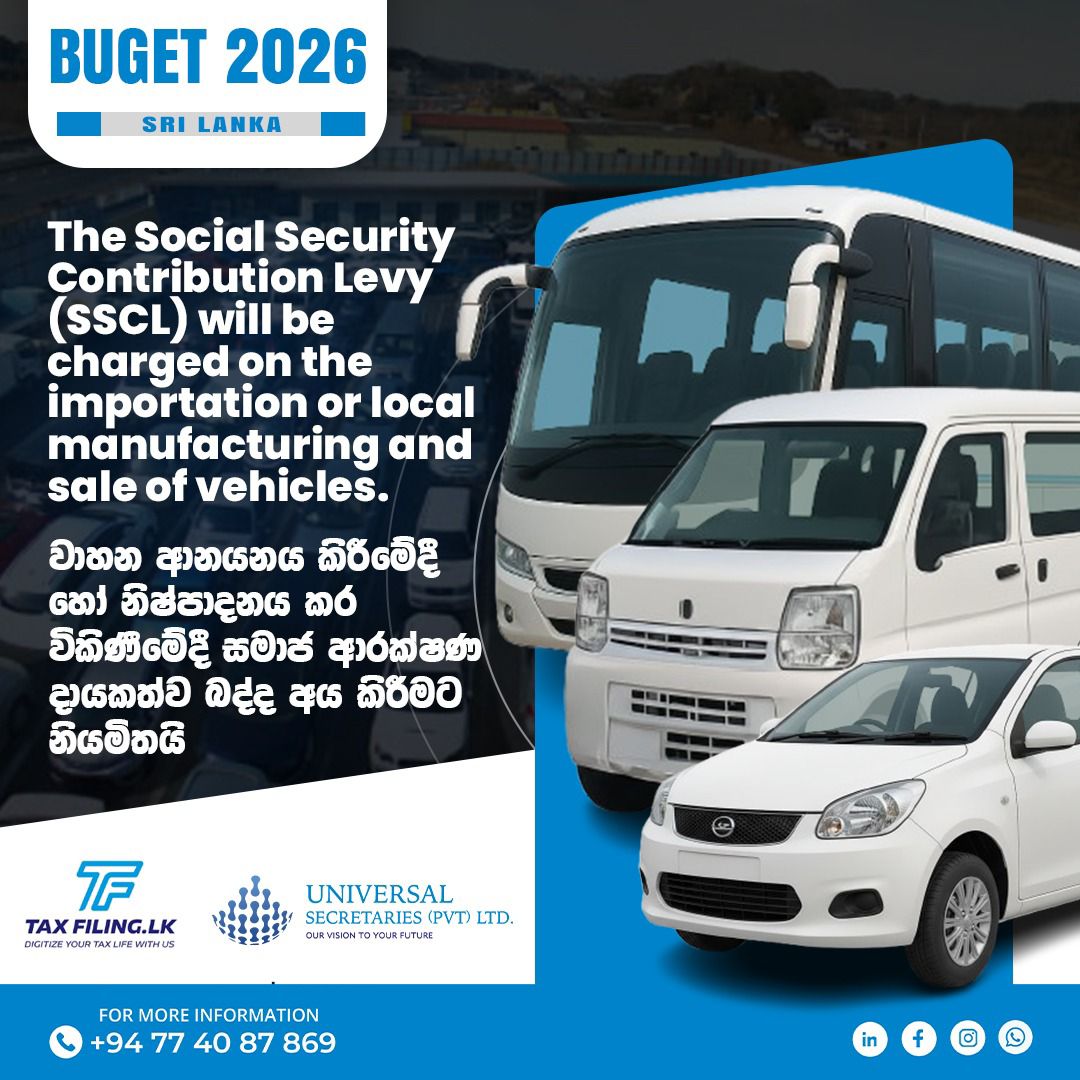
වාහන ආනයනය කිරීමේදී හෝ නිෂ්පාදනය කර විකිණීමේදී සමාජ ආරක්ෂණ දායකත්ව බද්ද අය කිරීමට නියමිතයි
The Social Security Contribution Levy (SSCL) will be charged on the importation or local manufacturing and sale of vehicles.
The Social Security Contribution Levy (SSCL) will be charged on the importation or local manufacturing and sale of vehicles.
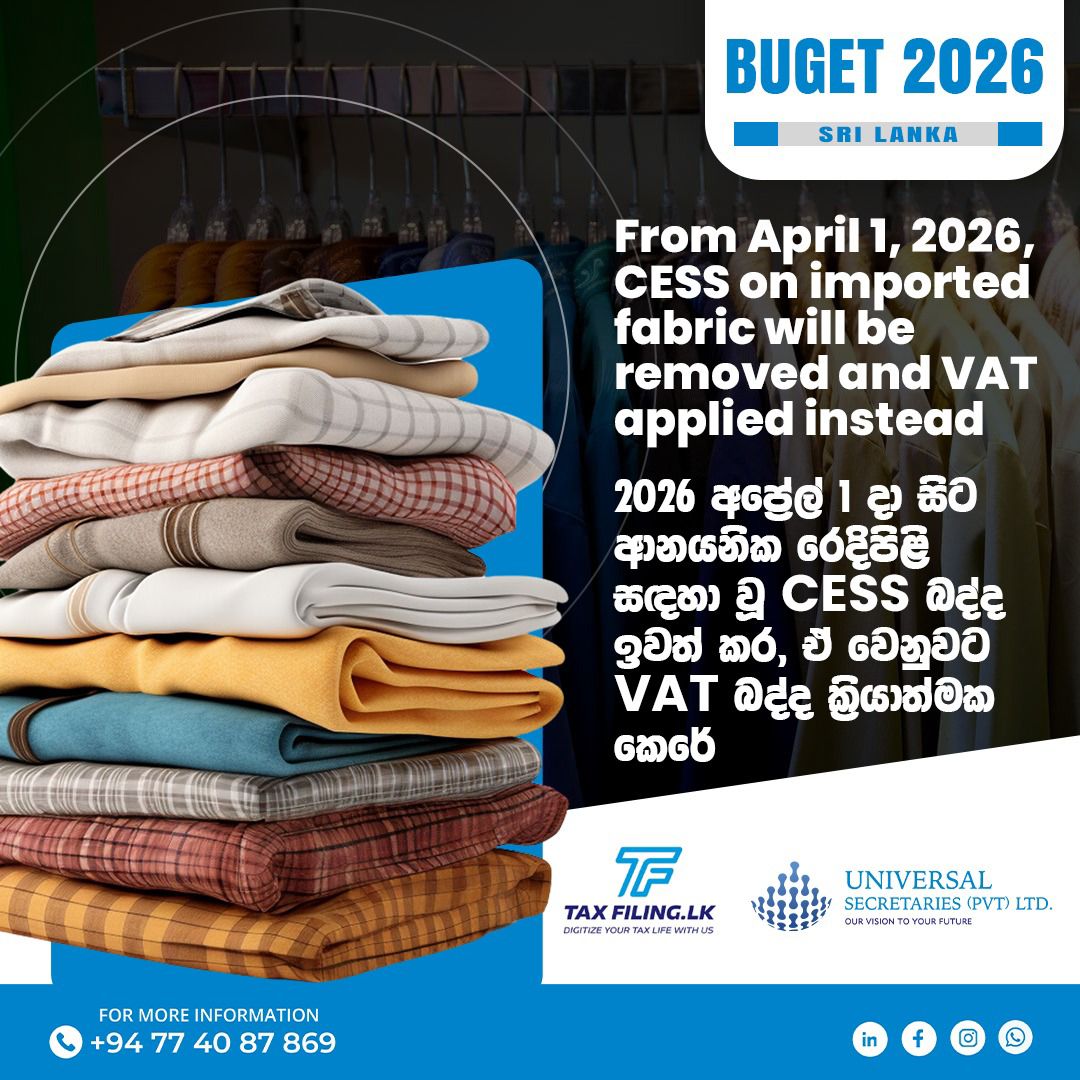
2026 අප්රේල් 1 දා සිට ආනයනික රෙදිපිළි සඳහා වූ CESS බද්ද ඉවත් කර, ඒ වෙනුවට VAT බද්ද ක්රියාත්මක කෙරේ
From April 1, 2026, CESS on imported fabric will be removed and VAT applied instead.
From April 1, 2026, CESS on imported fabric will be removed and VAT applied instead.
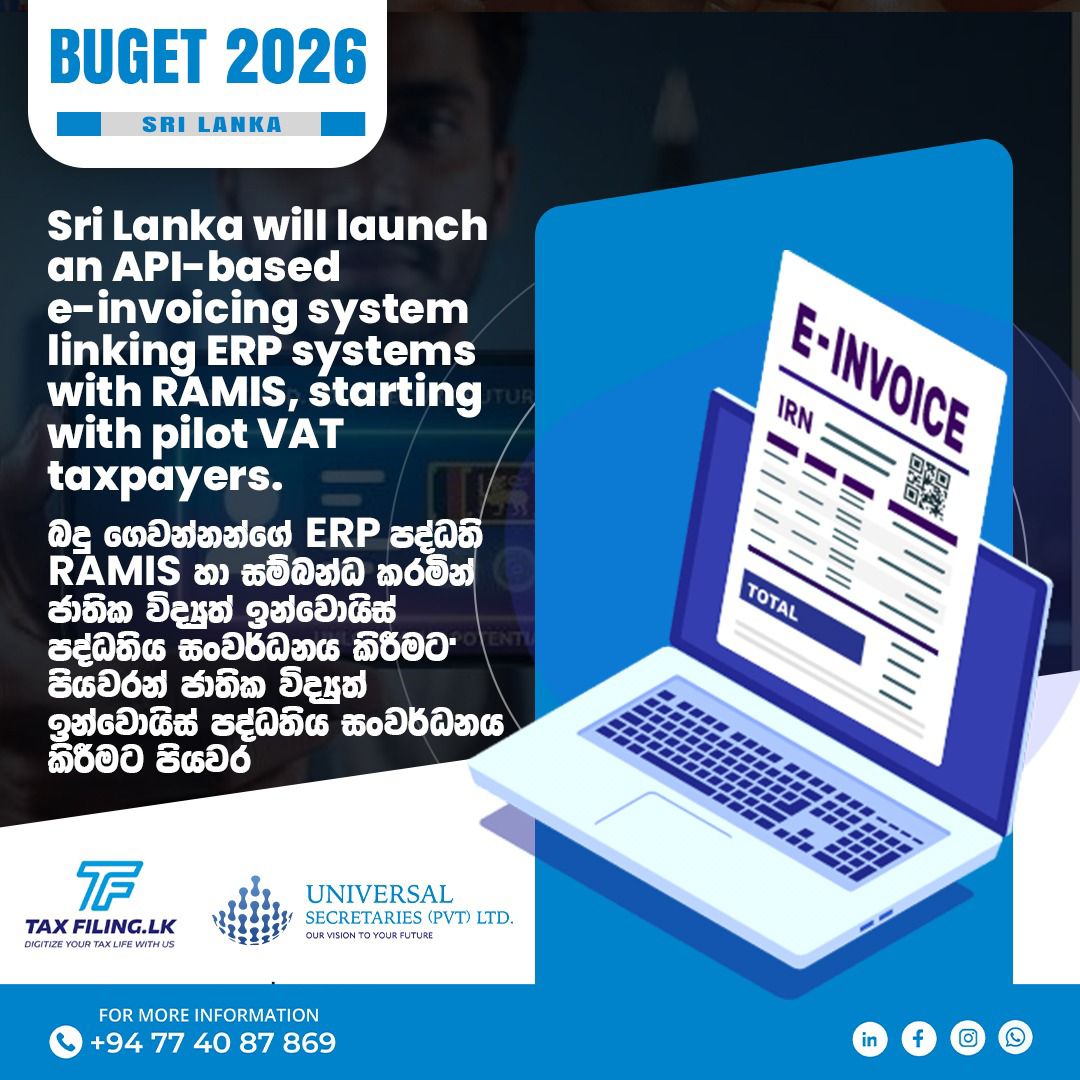
බදු ගෙවන්නන්ගේ ERP පද්ධති RAMIS හා සම්බන්ධ කරමින් ජාතික විද්යුත් ඉන්වොයිස් පද්ධතිය සංවර්ධනය කිරීමට පියවර
Sri Lanka will launch an API-based e-invoicing system linking ERP systems with RAMIS, starting with pilot VAT taxpayers.
#EInvoicing #RAMIS #ERPSystems #DigitalTaxation #IRDSriLanka #Budget2026 #SriLanka #universalsecretaries
Sri Lanka will launch an API-based e-invoicing system linking ERP systems with RAMIS, starting with pilot VAT taxpayers.
#EInvoicing #RAMIS #ERPSystems #DigitalTaxation #IRDSriLanka #Budget2026 #SriLanka #universalsecretaries
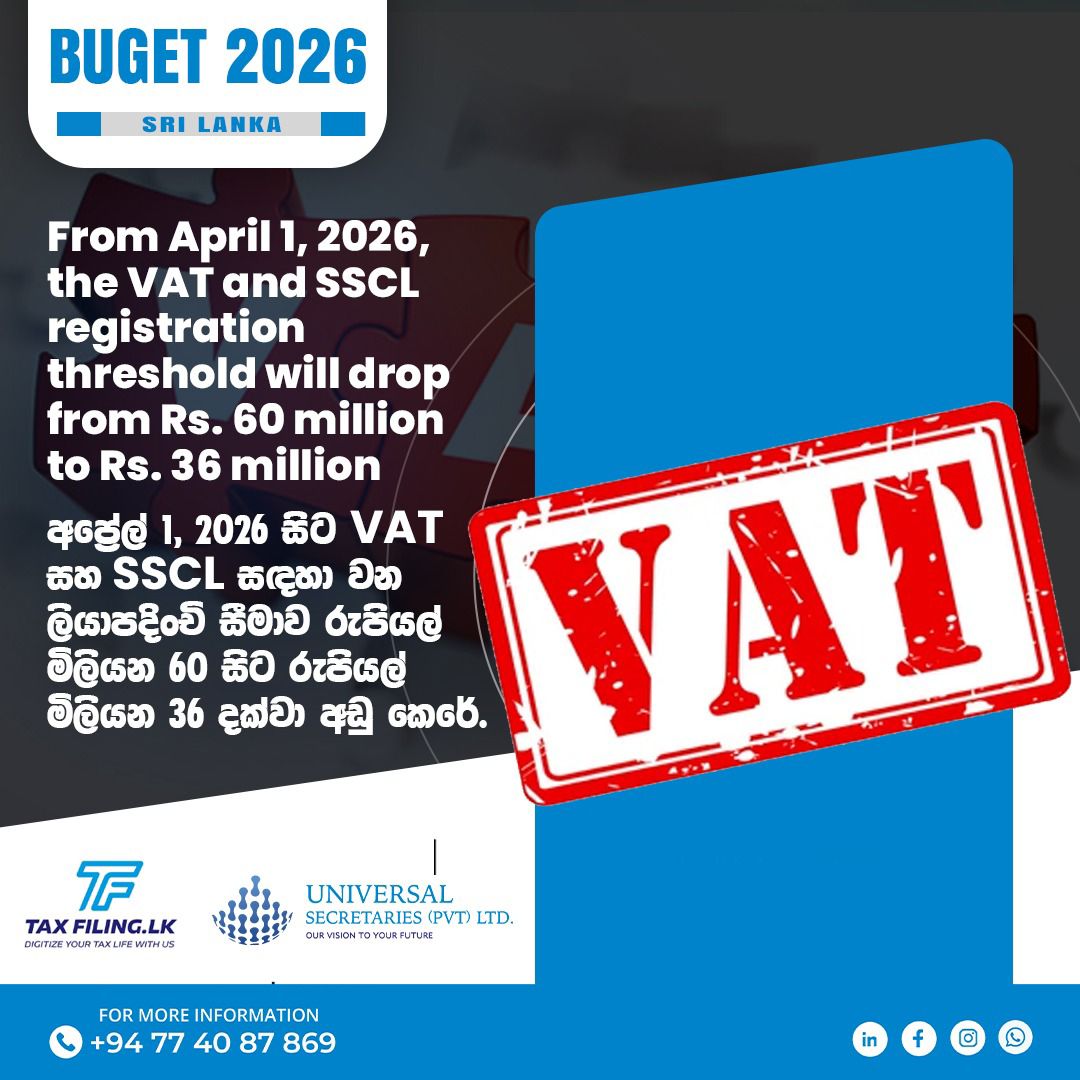
අප්රේල් 1, 2026 සිට VAT සහ SSCL සඳහා වන ලියාපදිංචි සීමාව රුපියල් මිලියන 60 සිට රුපියල් මිලියන 36 දක්වා අඩු කෙරේ.
From April 1, 2026, the VAT and SSCL registration threshold will drop from Rs. 60 million to Rs. 36 million.
From April 1, 2026, the VAT and SSCL registration threshold will drop from Rs. 60 million to Rs. 36 million.
Sri Lanka Budget 2026
- 01:18 PM – President Anura Kumara Dissanayake arrived at Parliament to present the Budget 2026, his first full-year fiscal plan as Minister of Finance.
- 01:37 PM – The President officially began delivering the Sri Lanka Budget 2026 Speech, outlining key priorities for economic recovery, digital transformation, and fair taxation.
- 01:47 PM – He announced that the government aims to keep inflation below 5%, ensuring stable prices and sustainable growth.
- 01:49 PM – Finance Minister Dissanayake highlighted that Sri Lanka has achieved macroeconomic stability, with inflation easing and government revenue expected to reach 16% of GDP.
- 01:50 PM – The government targets to maintain the debt-to-GDP ratio at 87% by 2027, demonstrating a strong commitment to fiscal discipline and debt sustainability.
- 01:52 PM – A new Digital Assets Declaration System will be introduced in March 2026 to promote transparency and prevent tax evasion.
- 01:53 PM – Plans are underway to launch a national e-procurement system, increasing efficiency and reducing corruption in public-sector purchasing.
- 01:55 PM – The government will remove biased methods of granting tax concessions, ensuring a transparent and fair incentive framework for all investors.
- 01:57 PM – A comprehensive list of all businesses receiving tax exemptions will be published online twice a year for public review, strengthening fiscal accountability.
- 01:59 PM – The Port City Act and Strategic Development Act will be amended to ensure tax concessions are granted with transparency and due process.
- 02:01 PM – The SVAT system (Suspended VAT) will be abolished, and a VAT refund-based system introduced to simplify compliance and speed up refunds.
- 02:05 PM – A special committee of experts will be appointed to draft a Code of Ethics for Sri Lanka’s Judicial Service.
- 02:08 PM – Another expert committee will be formed to negotiate new Free Trade Agreements (FTAs) to expand export opportunities.
- 02:10 PM – The President reaffirmed a zero-tolerance policy for corruption, fraud, and criminal activity — stating that no one is above the law.
- 02:15 PM – Government revenue is projected to remain at 15.6% of GDP in 2026 and 15.4% in 2027, qualifying Sri Lanka for a 0.75% loan interest rate reduction, saving the nation about USD 7.5 million annually.
- 02:18 PM – Strong emphasis will be placed on accelerating digital transformation across both public and private sectors.
- 02:19 PM – Public investment is set to increase to 4% of GDP, with a focus on sustainable growth projects.
- 02:22 PM – A new legal framework has been implemented to strengthen control over government spending and reduce waste.
- 02:23 PM – The Finance Minister reaffirmed that every rupee of public funds will be managed with maximum responsibility and transparency.
- 02:24 PM – The RAMIS tax administration system will be upgraded to version 3.5 to improve automation and online tax services.
- 02:25 PM – The government aims to adjust the direct-to-indirect tax ratio from 25:75 to 40:60, promoting fairer tax distribution.
- 02:28 PM – A new Public-Private Partnership (PPP) Framework will be presented to Parliament early next year to attract long-term investments.
- 02:29 PM – Work has begun on drafting the Investment Protection Act, ensuring investor confidence and legal stability for both domestic and foreign investors.
- 02:31 PM – The budget deficit will be reduced to 5.2%, signaling fiscal responsibility and macroeconomic reform.
- 02:33 PM – A Single-Window Investment Facilitation System will be launched, with Rs. 100 million allocated for setup.
- 02:34 PM – The government will introduce a Resident Visa Program for foreign investors, encouraging more foreign direct investment (FDI).
- 02:35 PM – Rs. 100 million allocated to create a digital land information system for better land management and ownership transparency.
- 02:37 PM – Two new IT zones will be established in Digana and Nuwara Eliya under the BOI, supporting Sri Lanka’s growing digital economy.
- 02:38 PM – Institutions like IDB, NEDA, and SEDA will be restructured under the Industrial Development Board (IDB) to streamline SME support.
- 02:42 PM – SME entrepreneurs will receive loan facilities ranging from Rs. 15 million to Rs. 50 million, with funding already allocated.
- 02:44 PM – The minimum investment threshold for tax incentives has been reduced from USD 3 million to USD 250,000 to encourage SME participation.
- 02:45 PM – Rs. 2.5 billion will fund the creation of a National Single Window to simplify import–export processes.
- 02:49 PM – Rs. 1 billion allocated to enhance investment zone services, while internal airports in Jaffna, Hingurakgoda, and Sigiriya will be developed to promote regional tourism and logistics.
- 02:51 PM – Rs. 35.6 billion will be invested to advance digitalization in Sri Lanka, supporting public-sector efficiency.
- 02:52 PM – 900 state bungalows will be converted into income-generating properties through public–private partnerships (PPPs).
- 02:53 PM – The Digital National ID system will be rolled out by March 2026, with full implementation within the same year.
- 03:00 PM – All QR code payments below Rs. 5,000 will be exempt from service charges, promoting a cashless economy.
- 03:03 PM – The government will promote AI data centers and provide broadband vouchers for children of Aswesuma beneficiaries to bridge the digital divide.
- 03:05 PM – Digital tower investors will receive a five-year tax exemption, boosting ICT infrastructure.
- 03:12 PM – All government transactions will move to a fully digital payment platform, with no fees for online payments.
- 03:15 PM – The Agni Fund will be launched to support startups and innovation-led businesses.
- 03:17 PM – Additional funding will strengthen vocational training institutes to enhance youth employability.
- 03:19 PM – Private companies employing differently-abled workers will receive Rs. 15,000 per employee monthly for two years, backed by Rs. 500 million.
- 03:20 PM – The Mahapola Scholarship increased by Rs. 2,500 to support students.
- 03:22 PM – Rs. 31 billion allocated to upgrade hospitals nationwide over the next five years.
- 03:23 PM – Rs. 4.2 billion for the Suwasariya Ambulance Service, and Rs. 500 million for special needs day-care centers.
- 03:25 PM – Rs. 750 million allocated to establish AI Service Centers to foster digital innovation.
- 03:32 PM – From January 2026, the estate sector minimum wage increases from Rs. 1,350 to Rs. 1,550, plus a Rs. 200 daily incentive (Rs. 5 billion allocated).
- 03:34 PM – A housing loan program for Sri Lankans working overseas will be launched at concessionary rates.
- 03:35 PM – A pension fund will be created for migrant workers, ensuring retirement security.
- 03:45 PM – Measures announced to reduce human–elephant conflict and protect wildlife habitats.
- 03:46 PM – Rs. 24 billion for rural roads and Rs. 2.5 billion for rural bridges to improve connectivity.
- 03:47 PM – Rs. 1 billion for a milk industry feasibility study, aiming to meet 75% of domestic demand by 2030.
- 03:53 PM – Rs. 1 billion allocated for cattle and swine breeding programs to support the livestock sector.
- 03:56 PM – Rs. 3 billion for renovating the Badalgama Milco factory, enhancing milk production capacity.
- 04:01 PM – Rs. 350 million allocated for Valaichchenai Fishing Harbour development.
- 04:05 PM – Rs. 342 billion set aside for nationwide road development projects.
- 04:10 PM – Rs. 66.15 billion for Kadawatha–Mirigama Expressway construction under the expressway network expansion.
- 04:11 PM – Rs. 330 million allocated for a Port City–Marine Drive link study to ease Colombo traffic.
- 04:12 PM – Rs. 1 billion for a national road safety program targeting hazardous road sections.
- 04:23 PM – Funding allocated to complete pending highway sections across the country.
- 04:32 PM – A competitive bidding process introduced to improve public procurement transparency.
- 04:33 PM – Rs. 2 billion for feasibility studies in 10 cities including Jaffna, Eheliyagoda, Batticaloa, Chilaw, and Matara.
- 04:34 PM – Matale to be expanded to four lanes; Hatton to receive a new urban plan (Rs. 500 million allocated).
- 04:35 PM – Rs. 2.5 billion to support local authorities through income-based contributions.
- 04:36 PM – 27,000 new houses to be built in 2026, and Rs. 100 million allocated for a pet care pilot project in Kesbewa and Piliyandala.
- 04:38 PM – Over Rs. 33 billion for housing projects including 70,000 new homes, urban renewal, and resettlement programs.
- 04:49 PM – Rs. 1 billion allocated to digitize public service processes under the Digital Blueprint program.
- 04:51 PM – Rs. 12.5 billion to purchase vehicles and machinery for provincial institutions.
- 04:53 PM – Rs. 5 billion to settle EPF, ETF, gratuity, and tax arrears of state enterprises.
- 04:54 PM – Outstanding Treasury guarantees and letters of comfort to be cleared by end of 2026.
- 04:55 PM – The government will settle senior citizens’ interest arrears, paying Rs. 10 billion in 2025 and Rs. 45.7 billion in 2026.
- 04:59 PM – A Salaries and Pensions Commission will be created to address salary anomalies.
- 05:04 PM – Festive advance for government workers increased from Rs. 10,000 to Rs. 15,000.
- 05:05 PM – Teacher and principal allowances to increase by Rs. 1,500 each (Rs. 1 billion allocated).
- 05:06 PM – Railway gatekeeper allowance raised to Rs. 15,000 per month (Rs. 250 million allocated).
- 05:07 PM – Around 9,800 public employees to receive permanent appointments.
- 05:08 PM – Under the Public Financial Management Act, the government targets tax revenue above 15% of GDP to fund social investment.
- 05:09 PM – SVAT system abolished from October 2025, replaced by a refund-based VAT process; 300,000 new taxpayers registered.
- 05:09 PM – Tax revenue grew from Rs. 2.9 trillion (2024) to Rs. 3.8 trillion (2025), showing improved compliance.
- 05:10 PM – The government continues tax reforms promoting fairness and digital accountability.
- 05:10 PM – From April 2026, Special Commodity Levy on coconut and palm oil will be replaced by VAT and SSCL.
- 05:11 PM – From April 1, 2026, VAT and SSCL threshold reduced from Rs. 60 million to Rs. 36 million.
- 05:12 PM – From April 1, 2026, CESS on imported fabric removed and VAT applied.
- 05:12 PM – From April 2026, SSCL on vehicles will be collected at import or manufacturing stage; after-sales exempt.
- 05:14 PM – Customs duties revised to 0%, 10%, 20%, and 30% under the National Tariff Policy.
- 05:15 PM – From January 2026, a modern, risk-based tax audit system will be launched.
- 05:18 PM – Telecommunications Tax Act to be amended to cover bad debt provisions and AML enforcement.
- 05:19 PM – A national e-invoicing system to be implemented via API-based integration with RAMIS, beginning with pilot companies.
- 05:20 PM – In Phase 3, e-invoicing will connect to POS machines for real-time VAT monitoring.
- 05:21 PM – Rs. 2 billion allocated for a new Inland Revenue Department complex to improve efficiency and taxpayer services.
- 05:22 PM – Budget reports to be published earlier: Final Report by May 31 and Mid-Year Report by August 31.
- 05:52 PM – Finance Minister Anura Kumara Dissanayake concluded the Budget Speech 2026, thanking all contributors and urging collective effort for Sri Lanka’s recovery.
